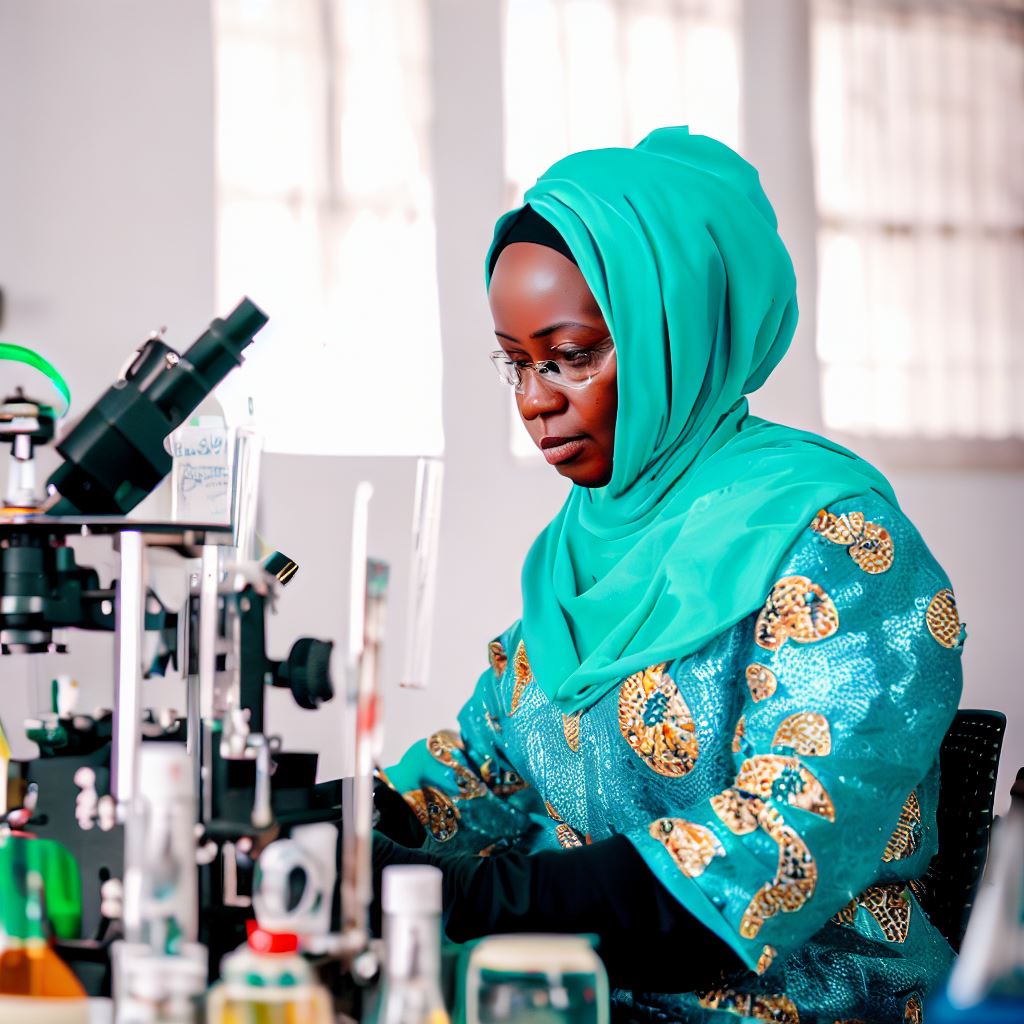Introduction
The role of women in Nigerian biochemistry cannot be over-emphasized.
As we embark on this exploration of Nigerian biochemistry, we must focus our lens on a crucial aspect—the role of women in this dynamic field.
In a gender equality struggle, recognizing women biochemists’ contributions and addressing their unique challenges is vital.
Nigerian biochemistry plays a crucial role in the country’s scientific progress.
It examines chemical processes within living organisms, providing insights into disease treatment and valuable discoveries.
In the sections that follow, we will introduce you to these trailblazing women, share their stories, and delve into their remarkable achievements.
We will also examine the steps needed to create a more inclusive and equitable environment for women in Nigerian biochemistry.
This blog post seeks to shed light on the role of women in this field, highlighting their contributions and the challenges they face in Nigerian biochemistry.
Historical background
The historical context of women’s participation in science in Nigeria
In Nigeria, women have historically faced challenges in actively participating in scientific fields. Social and cultural norms have limited their involvement.
Traditionally, women were encouraged to focus on family duties and their roles were confined to domestic responsibilities.
This limited access to education and professional opportunities for Nigerian women, including those interested in pursuing biochemistry careers.
Challenges and barriers faced by women in pursuing biochemistry careers
- Lack of access to quality education: Women faced limited opportunities in acquiring higher education, especially in scientific fields.
- Societal expectations: Gendered expectations placed greater emphasis on marriage and family, diverting women away from pursuing professional careers.
- Gender discrimination: Women encountered prejudice and biases in male-dominated academic and professional environments.
- Work-life balance: Juggling professional commitments and family responsibilities presented significant challenges for women in biochemistry careers.
Notable Nigerian female biochemists who have made significant contributions
- Prof. Christiana Ngozi Anyaoku: Pioneering Nigerian biochemist who made significant contributions to plant biochemistry research.
- Prof. Grace Oladunni Taylor: Renowned for her groundbreaking work in enzymology and enzyme kinetics.
- Prof. Felicia Oluwatoyin Ojo: A leading expert in molecular biology and biotechnology, with notable contributions to cancer research.
- Dr. Justina Nnabuko Ekpa: Known for her research on nutrition and metabolism, particularly in relation to HIV/AIDS.
- Dr. Oluyemisi Mabel Ogunlana: Acclaimed for her research on drug metabolism and its impact on public health.
Despite the challenges faced by Nigerian women in pursuing biochemistry careers, these notable female biochemists have paved the way for future generations.
Their achievements serve as a testament to the capabilities and potential of women in the field of biochemistry.
Efforts to promote gender equality and provide more opportunities for women in science are crucial in advancing scientific research and innovation in Nigeria.
By addressing barriers, providing education, and fostering inclusivity, Nigeria can empower its female biochemists to reach their full potential.
It is imperative that society recognizes and values the contributions of women in biochemistry, encouraging and supporting their active involvement in scientific research.
The progress of Nigerian biochemistry will greatly benefit from the inclusion and equal representation of women in the field.
Investing in women’s education and promoting diversity and gender equality will drive biochemistry advancements in Nigeria.
Read: Biochemistry: Key Universities in Nigeria
Current Scenario
Present statistics and data on the representation of women in Nigerian biochemistry
In Nigerian biochemistry, women make up only a small percentage of the total workforce.
There has been a significant increase in the representation of women in Nigerian biochemistry over the past decade.
Initiatives such as mentorship programs and scholarships have contributed to this positive trend.
Gender equality in the field is still a work in progress, with discriminatory practices and biases persisting.
However, the overall outlook for women in Nigerian biochemistry is improving.
Advancements Made Towards Gender Equality
- More women are enrolling in biochemistry programs at Nigerian universities, reflecting a growing interest in the field.
- Leading research institutes in Nigeria are actively promoting gender equality and inclusivity in their hiring practices.
- Female biochemists are receiving recognition for their contributions through awards and honors.
- Women scientists are being invited to speak at conferences and participate in research collaborations.
Initiatives and Organizations Supporting Women in Science
- The Nigerian Association of Female Biochemists (NAFB) provides a platform for networking and professional development.
- The Women in Science and Technology (WIST) initiative offers mentorship programs for young women pursuing careers in biochemistry.
- The African Women in Biochemistry and Molecular Biology Network (AWBMBN) promotes collaboration and knowledge sharing.
- Government-funded scholarships specifically target women in the STEM fields, including biochemistry.
In fact, while there is still progress to be made, the role of women in Nigerian biochemistry is growing stronger.
With increased representation, advancements toward gender equality, and support from various initiatives and organizations, women are carving out their place in the field.
It is crucial to continue promoting diversity and inclusivity to ensure that women in Nigerian biochemistry are empowered to succeed and contribute to scientific advancements.
Read: The Future of Biochemistry Careers in Nigeria

Success Stories
Inspiring stories of Nigerian women who have achieved success in biochemistry
- Ngozi Okonjo-Iweala: The first female Minister of Finance in Nigeria and a renowned biochemist.
Her contributions to biochemistry research have helped in developing strategies to combat infectious diseases.
Through her work, Okonjo-Iweala has emphasized the importance of education in empowering women. - Amina J. Mohammed: A Nigerian biochemist who served as the Minister of Environment.
She played a significant role in the Paris Agreement negotiations, advocating for sustainable development.
Her achievements prove that women can excel in both science and policy-making. - Funmilayo Olayinka: A pioneer Nigerian biochemist and the first female Deputy Governor of Ondo State.
She dedicated her career to promoting women’s rights and championing affordable healthcare.
Olayinka’s accomplishments inspire young women to pursue biochemistry and make a difference.
These women have shattered glass ceilings, proving that gender should never be a hindrance to success.
By showcasing their achievements, more young girls are encouraged to follow their passion for biochemistry.
The importance of role models and mentorship in encouraging more women to pursue biochemistry
It is crucial to have role models who highlight the possibilities and opportunities within the field.
- Through mentorship programs, successful women can guide and support aspiring female biochemists.
- Role models play a vital role in bridging the gender gap in science and inspiring future generations.
- They provide guidance, encouragement, and practical advice to help women navigate their careers.
- Mentorship programs create networks that empower women in biochemistry to overcome challenges.
- Having a supportive community helps women gain confidence and succeed in their chosen paths.
- Success stories like these demonstrate that women can excel in biochemistry and contribute significantly.
- Women’s participation in the field brings diverse perspectives, fostering innovation and progress.
- By highlighting these achievements, society can challenge gender stereotypes and biases.
- It is crucial to create an inclusive environment that nurtures the talents and abilities of all individuals.
- Empowering women in biochemistry benefits not only the field but also the entire society.
In short, Nigerian women have made remarkable contributions and achieved success in the field of biochemistry.
Ngozi Okonjo-Iweala, Amina J. Mohammed, and Funmilayo Olayinka are inspiring role models who shattered barriers for women.
Their achievements emphasize the importance of role models and mentorship in encouraging more women to pursue biochemistry.
Highlighting success stories and mentorship programs can foster a supportive environment for women to excel in science.
Read: Biochemistry in Nigeria: Job Opportunities
Obstacles and Solutions
In Nigeria, women face numerous obstacles and stereotypes that hinder their progress in the field of biochemistry.
Challenges can restrict opportunities, necessitating discussions on strategies and solutions for an inclusive environment for women.
Existing Obstacles and Stereotypes
- Lack of access to education: Limited resources and societal beliefs often prevent girls from pursuing higher education in biochemistry.
- Gender bias: Preconceived notions that women are less capable than men in scientific fields undermine their potential.
- Cultural expectations: Traditional gender roles and responsibilities place additional burdens on women, making it difficult to balance career and family life.
- Discrimination in the workplace: Women often face discrimination and unequal treatment when it comes to promotions and opportunities for career advancement.
Strategies and Solutions
- Promoting education: Encourage girls and women to pursue biochemistry with scholarships, mentorships, and educational outreach programs.
- Gender sensitization: Conducting workshops and awareness campaigns to challenge and change stereotypes that hinder women’s progress.
- Empowering women in leadership roles: Empower women in leadership roles, offering growth and development opportunities within the field.
- Developing supportive policies: Adopt policies for work-life balance, including flexible hours and parental leave, to assist women in managing responsibilities.
- Mentorship and networking programs: Create platforms for women to connect with experienced professionals for career guidance and support.
- Advocacy for equal opportunities: Lobbying for equal representation and opportunities for women in research funding, conference presentations, and leadership positions.
- Creating safe spaces: Establishing safe spaces and support groups where women can share experiences, seek advice, and find mentorship within their field.
Importance of a Supportive and Inclusive Environment
- Enhanced productivity and innovation: Diverse and inclusive workplaces enhance creativity.
It also enhances collaboration, and diverse perspectives, fueling research and scientific progress. - Retention and career progression: Supportive environments retain talented women, allowing them to contribute and advance their careers in the field.
- Role modeling for future generations: Visible successful women in biochemistry inspire younger generations to pursue careers in the field.
- Social and economic impact: Gender equality in biochemistry fosters societal development, reduces gender gaps, and spurs economic growth.
In essence, tackling obstacles and stereotypes is crucial for fostering inclusivity and support for women in Nigerian biochemistry.
Implementing strategies like education, empowering women in leadership, and ensuring equal opportunities can unlock women’s full potential in biochemistry.
Read: Nigerian Biochemists: Success Stories
Conclusion
In review, this blog post has highlighted the key points regarding the role of women in Nigerian biochemistry.
We have discussed the challenges that women face and the limited opportunities they have in this field.
However, it is essential to recognize the importance of women’s participation in Nigerian biochemistry.
Women bring unique perspectives, skills, and expertise to the table, which can greatly contribute to the advancement of biochemistry in Nigeria.
To promote gender equality and support women in pursuing biochemistry careers, we must take action.
It is crucial to advocate for equal opportunities, eliminate gender biases and stereotypes, and provide mentorship and support to aspiring women biochemists.
By empowering women and encouraging their active involvement in Nigerian biochemistry, we can foster innovation, diversity, and progress in this field.
Let us come together to create a more inclusive environment and ensure that all aspiring women biochemists have the resources and support they need to succeed.
It is time to break down barriers and build a brighter future for Nigerian women in biochemistry.




